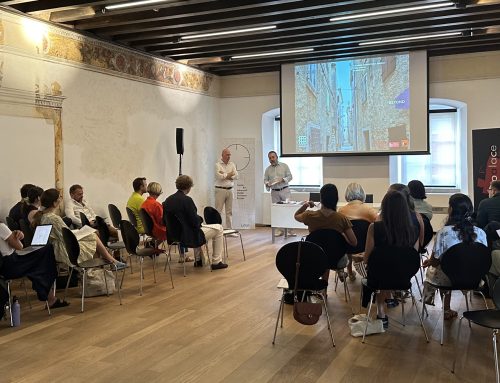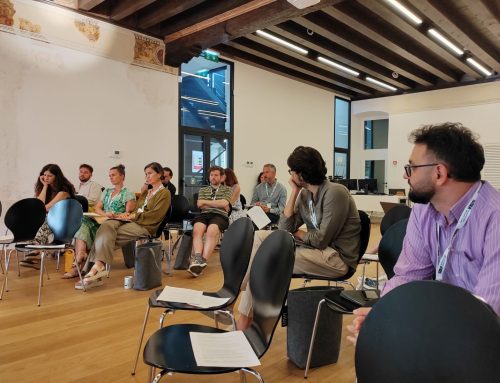March 2020
As a form of keeping spirits under the newly-developing global circumstances, we asked our 2020 Fellows to send us a few words about how are they holding up, and to share thoughts they might have on the COVID-19 crisis. The aim was not to delve too deep into theoretical and scientific discussions, which we will most certainly focus on in the near future. At this point, our aim was to gather notes on experiences as the record (document) of our global strange spring of 2020.
Federica Porcheddu
I’m in Sassari right know. We are lockdown since the 9th of March. We had further restrictions since Saturday until April 3 and all non-essential services have been suspended. It is possible to go out just for food, medication purposes or to let our pets out. Here in Sardinia, we have more than 340 infected, most of them in Sassari. The situation is difficult and stressful but I am trying to stay focused and to continue my research as much as possible.
The coronavirus emergency has turned our plans and our lives upside down. It forced us to stop. To remain isolated. The whole world has been forced to stop in front of an invisible enemy, who makes no distinction between the rich and the poor, between the homeless and the businessman. For the virus, we are all the same. We are all equally exposed to danger. All equally fragile. This forces us to rethink what the priorities are. It is difficult to imagine what the global scenario will be once the crisis is over, but when everything returns to normal, will we have changed? Will we have learned that our life on earth cannot be separated from the protection of life, and at the same time, of the environment? I think that the big challenge is to rethink our way of being together and our way of being political. More simply, our way of being human.
Valentina Moro
I am in Friuli-Venezia Giulia. Luckily, my family and my beloved ones are healthy and we are all trying to cope with it in the best way. In my region, everything has been gradually locked down: starting from schools and public events, now also the unnecessary industrial activities have been shut down.
Unfortunately, many workers still have to go to work and they are concerned and panicked. Some of them are striking all over Italy.
Generally speaking, I think that it is a very confused and frightening period. The tension is increasing and the people need to see positive results after all of the efforts most of us did, spending the last weeks locked at home.
From a political perspective, I think that the biggest challenge is to keep pursuing solidarity and creating networks of support. It seems always more difficult and selfish to say that the virus is not the only enemy, but this is so important. The idea that the only way to cope with the emergency is to stay obedient and separated can be very dangerous: this is a bad message. The challenge for the social movements – and particularly for feminist movements, I would say – is to keep fighting for social equality, for the environment, and for all of the other critical situations the virus has dramatically shed new light on. Even – and most importantly – while being socially distanced. Here just as all over the world.
Alessandra Scotti
I’m in Naples and today is my 15th day of quarantine. Luckily I’m fine and all my loved ones are fine too. The last official bulletin counted 1013 positives in my region. The daily percentage of new cases of Covid-19 is 8,2%, lower than the one recorded in the last few days and, after weeks, below 10%. It represents a relevant hopeful sign and, maybe, first feedback after the restriction measures.
Of course, we can’t let our guard now. Our hospitals are already full and we are all concerned about the situation in northern Italy and in the rest of Europe. I keep doing my Bioethics course on Teams and I often talk with my virtual class about the ethical issues linked to this pandemic, like the problem of resource allocations. Allocating scarce resources in a big crisis could be ethically and humanly wrenching.
I wonder if we – as humankind – can get something good out of it. I agree with what Harari said in his article on Financial Times: “The decisions people and governments take in the next few weeks will probably shape the world for years to come. In this time of crisis, we face two particularly important choices. The first is between totalitarian surveillance and citizen empowerment. The second is between nationalist isolation and global solidarity”. I’m rooting for the second one.
I still try to be productive with my research, even if it’s not easy and I miss libraries and friends.
My deepest sympathy to Zagreb city.
Francesca Rolandi
Coronavirus reached me while I was in Belgrade for archival research. At the end of February, I was notified by the airline company I flew with nine days before that a confirmed case of coronavirus among the passengers of the flight had been detected. It was the first time that I possibly came in contact with the virus, and the first time that it changed my plans.
After necessary days of self-isolation, I went back to Milano, the medical emergency was already serious but seemed to be under control. Since I was then supposed to travel to Rijeka within a couple of days, I started following carefully the restrictions introduced both in Italy and Croatia. The situation escalated much faster than expected and it soon became clear that the national borders were about to be sealed. Similarly, every country was acting without any coordination with its neighbors.
When my isolation was over, the Lombardy region and soon the entire country were already in lockdown.
While entering my 26th day of the quarantine, I am trying to reflect upon the possible outcomes of this crisis, considering both challenges and opportunities. I am trying to do it historically, as a scholar who has dealt with post-war transitions. Every crisis brings about the risk of further marginalization of the most endangered categories, as we can see, for instance, on the “Balkan route“, where refugees are both further criminalized and abandoned. However, I hope that some of the contradictions that emerged during this crisis will contribute to raising awareness. I guess that many Italian citizens got more aware of the value of the Italian healthcare system, currently on the front line, although being chronically underfinanced and affected by the diversion of resources to the private one.
Xenia Chiaramonte
Shortly before Lombardy became a red zone, I had moved to the north-east of Italy intending to reach Croatia in the following days to begin my stay at the CAS. My friends in Trieste would keep me company, I thought. The truth is that in those moments there is a particular ethical and pre-juridical sense of self-discipline. My thought was to be a potential plague spreader, although in the previous weeks I had taken every precaution against the common invisible enemy.
I haven’t met anyone. I waited. I had arrived by car and so I went back, taking my days in Milan as an inner journey and a self-care gymnasium.
The air we breathe now is clean: this is one of the most unforgettable utilities of calamity. A calamity that every day seems more human and less divine, offered to us by the neoliberal reason with its financial cuts to essential services, to research, in a word to life.
Vladan Sutanovac
The stories-of-today(s) we’d like to share come from the cross-roads of Vienna (Austria) and Niš (Serbia). When it comes to the former, although my previous visit, before the outbreak, took me there mid-October for my Ph.D. defense, Vienna being my second home, at the moment I still keep close ties via my mentors, fellow-scholars, and friends. The latest from them is that Vienna/Austria has followed in the footsteps of the general population movement-constraints. The same goes for Niš/Serbia. The figures are on the rise, as just about everywhere in the world, the general impression being, the more people keep to the benevolent instructions, the more benevolent the strain seems to become, rendering it dormant for another eon or two real soon, hopes are high. Other than that, from what I have gathered from our daily musings in virtuo vivo is that, in all other walks of daily life, it’s business-with-upbeat activities as usual. Our lack of physical contact, we compensate for by organizing mad hatter like chit-chat tea parties for hours on end. The remaining hours we divide between keeping up with our (my wife being also a fellowess sociologist) soft-science scientific musings, drawing on our year-(2018)-round Shanghainese ethnographic adventures, and soft-plays with our newborn starman Kozma and his first book on stellar delights.
Tanja Andić
In many ways, my life has not changed much at all. For the last few months, I have primarily been staying in my apartment trying to finish up my dissertation, so I can defend in May. The defense will be online now. My partner works from home, so our work lives were not particularly affected in the immediate sense. Our cats are happy that we are here even more than usual. In some sense, I shamefully felt a bit of relief at first – suddenly, my friends cannot call me to hang out, and I no longer had to feel guilty for saying no and again explain what exactly I’m doing, and why I’ve been doing it for so long, and “when will it be over?” For the first few days of the curfews, I took a break from writing and scrolled through the endless news about the virus. “What does a dissertation matter right now, anyway?” I thought. I chuckled at memes over group chats; one of the former Yugoslavs saying “first time?” to “the world falling apart” was a favorite among my group, a reminder that even dire circumstances eventually end. We then joked about which newspapers made the best toilet paper during the war. So it goes.
The evening applause at 20h for medical workers punctuates my evenings. I like that someone in the neighborhood always attempts to start clapping a couple of minutes early, and then realizes that maybe their clock is wrong, and trails off for a bit, waiting for everyone else to join in. The applause seems a little less cheerful some days; I wonder if it’s because the novelty has worn off, or if people are angry that some proposed measures are overstepping their capacities to provide for extended families while others which were meant to protect them never went through. I worry about my sister, who is a nurse in the US. I worry about the grocery store workers from my nearby shop, who have to interact with so many people every day. I worry about a lot of things, but this is nothing new, probably for most of us here. From inside my apartment, the various online news — the extremely wealthy managing to find ways to profit from the crisis, the potential rent strikes discussed over social media — all feels like a strange dream, predicting a future somewhere between a mundane dystopia peppered with inklings of hope for something better. I cannot think of a situation where seemingly every place on the planet is affected in some sense. Like others, I am hopeful that we will learn something from this and maybe even get something good out of it, globally.
My heart goes out to everyone here residing in or with friends and family in Italy and Zagreb, and of course other highly affected places, who are facing these states of exception in the most exceptional circumstances, to put it calmly. I greatly look forward to meeting everyone eventually and wish you all the best in the meantime.
Photo credit: Sergio Siano – Naples in Quarantine





